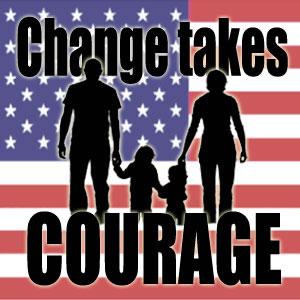
A few months ago, Illinois Representative Luis Gutierrez announced the “Change Takes Courage” campaign. The initiative challenged the president to exert leadership on immigration reform.
Sadly, courage and leadership are not traits found in most politicians. Their modus operandi is reactive in nature. If they feel a threat to their reelection, they start to adjust in accordance with the public winds of the day.
As a result, since far too many representatives lack the internal fortitude to push for change on their own, the public must externally provide the impetus for them to exercise such courage.
Towards The Great Society
As an immigration lawyer in Riverside, I’m unhappy how immigration officials, agencies, and courts treat and abuse immigrants.
As a concerned citizen and voter, I’m unhappy how our political leaders avoid dealing with immigration reform and a wide variety of other socially and economically important issues.
As a political activist and community organizer, I’m unhappy with the two-party system’s inability to resolve issues in a compassionate manner for those who need help the most.
Yet, I refuse to stop believing in, and fighting for, the dreams of a Great Society.
We can – if we are strong enough – end racial divisions and promote equality among our citizens, and fight poverty worldwide.
The Opportunity To Reform American
According to some reports, Obama has victory in the bag. The 2012 election outcome is a fait accompli. All the bantering is a mere prelude to his re-coronation.
Under this view, in the world of politics, money talks – and that’s the end of the story.
Since Obama has already amassed a huge war chest, he will again be able to fund an internet-based strategy along with a grassroots get-out-the-vote army, another four years is a done deal.
Not so fast.
Just because money talks, it doesn’t mean we have to listen.

As some media folks have started to recognize, there are strong undercurrents of dissent in Obama’s political base and liberal circles.
Even many of his centrist supporters from 2008 are not convinced he deserves four more years in the White House.
Dissent means opportunity.
For those of us unhappy with the ineffectiveness of the two party system, it’s our chance to seize the moment.
It’s our chance to renew hope for the future – the same hope extinguished for many voters by the administration’s reluctance to fight for promises made to them in 2008 – without relying on a particular candidate to lead us.
In other words, it’s our chance to reform American politics.
Political Liberation
When it comes to politics, we are often our own worst enemies.
To the extent we have become pawns of the two-party system, we have played a willing, though partly subconscious, role in allowing ourselves to be victimized.
Perhaps the biggest obstacle to mounting an independent or third party political challenge is our inability, or our discipline, to free ourselves from the psychological conditioning of the two-party system.
It works like this.
Once folks register as a Democrat, or as a Republican, it’s as if they’ve signed a lifetime contract to support their party leaders for better or worse ‘till death do them part.
As a Democrat, you’re bombarded with messages about why your party’s candidates are the greatest and the Republican opponents represents the Evil Empire.
This conditioning is not just about candidates. It’s about political, social, and economic issues as well.
You’re told, in effect, the other side’s views are wrong, short-sighted, misguided, and downright destructive. It’s the same ploy used by Republicans.
Meanwhile, the other side ignores you since your party indoctrination makes your vote a poor investment.
Over time, the more you hear a one-sided message, the more it becomes your message.
Your critical ability to analyze the world is cut off, short-circuited by the constant bombardment of repetitive political, social, and economic messages.
You become hesitant to take actions, on any issues, which deviate from the party command. And you fail to realize this is part of their mental stranglehold over you.
Of course, there have been some who managed to break away from this mind control. Just not enough to change our nation’s politics.
For instance, the number of politically disconnected voters is huge . . . and growing. Still, in spite of the expanding frustration with the Obama administration by his own supporters – Democrats, liberals, and centrists – many consider voting for a third party candidate off limits. They fear a GOP takeover.
Although the differences between Tweedle Dee and Tweedle Dum may be minor, the party indoctrination has conditioned them to perceive the differences as distinct as night and day.
But like children cannot run until they learn to walk, a socially and economically better tomorrow cannot happen unless we take those first steps of political liberation forward.
As Bob Marley once told the world, “Emancipate yourselves from mental slavery. None but ourselves can free our mind.”
By not liberating ourselves from the influence and control of the two-party system, we relegate ourselves to wait for tomorrow. We allow political history to repeat itself.
In this venture, we cannot fear failure. We must embrace falling as normal and remain strong in our resolve to get back up to try again.
So that if we don’t achieve our goals this upcoming election, we have set a new framework for future campaigns.
The Diversionary Tactics Of Apologists
“And when the public gets restless, scare the loyal base back into its subservient role.” After all, doesn’t political perception beget political reality?
Recently, I read an article implying that making immigration reform a high priority item for the next election is misplaced. The author suggested the focus on immigration was a failure of Latino leadership because it takes attention away from other issues affecting Hispanics like jobs, education, economics, and the nation’s general welfare.
Subtly emphasizing Obama supporters should stay the course, this argument rests on two flawed assumptions.
First, it assumes that merely because immigration reform is the number one issue for many Hispanics, Latinos, and others, it is the only important issue for them.
As I see it, the situation is similar to many of those involved in the pro-choice and pro-life movements. Abortion is not the only issue most of them care about. Many of these activists care deeply about other issues like the state of the economy, the troops abroad, and crime in urban areas. Yet, their hot button issue is abortion.
My career decision to become an immigration attorney hastens, not lessens, my drive to create a better nation and world for all peoples, in all areas of life.
Second, it assumes issues like jobs, education, and economics for immigrants can be categorized into separate boxes.
All of these issues affect Latinos, documented and undocumented, in the same ways as the general public – and in one sense, worse.
As the anti-immigrant hysteria focused on Hispanics has come more into the open, negative attitudes towards Latinos have been revealed in all these other areas.
To fight xenophobia on immigration is to fight racism on all issues.
In my view, the approach to politics expressed by this author is not only apologist, but also diversionary.
It’s part of the mind control exerted on party loyalists. If the party command cannot control the growing dissent, then minimize the number of active dissenters by causing them to question whether fighting over immigration reform is a worthy venture for the soul of our nation or selfish impulse when there are other important issues.
Once this idea is planted, it’s a short step to convince voters, already conditioned as party loyalists, not to bolt the ranks and join independent political movements.
For many, the value of an independent political challenge is lost by narrowing their view to victory and defeat at the polls.
Victory Is A Journey, Not A Destination
The reality is major political changes do not happen overnight.
For many would-be supporters of an independent reform party, this reality is not acceptable. They want change now, if not yesterday, and absent such an outcome, they’ll just stick with the status quo.
A point missed by many is that electoral losses can result in political victories, and even small victories are still victories.
Even if an independent challenge only garnered 5% of the vote, that 5% could make the difference between which candidate wins the election. This is political leverage, the type of leverage which could force political change on issues.
Moreover, it sets the stage for the next go-round in 2014.
To be effective in the long term, you have to be open to the possibility of losing in the short term.
This does not mean you aim for anything short of victory in the short term. Rather, it merely reflects an understanding that you will not give up at the first signs of setback.
In my view, however incrementally, the political liberation from the two-party system would lead to immigration reform, as well as political change on many important economic and social issues.
As I noted in The Obama Administration’s Hide-And-Seek Approach To Immigration Reform, the ongoing neglect on immigration has become so acute that most who care about this issue have started to lose hope it will ever take place.
The same sentiment exists across the board on many political issues.
Yet, we can make change happen.
Are you in?
By Carlos Batara, Immigration Law, Policy, And Politics




